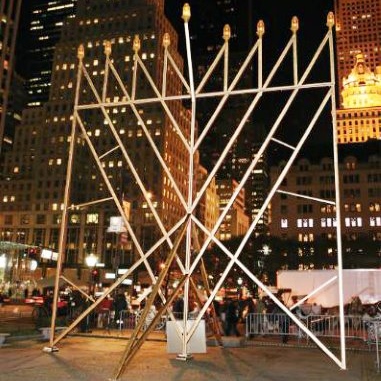
Parshot/Festivals

Eight fascinating facts about Chanukah
AISH.COM
Today we light a menorah for eight days to recall this miracle, and to be inspired by its message.
- The war of the Maccabees was the world’s first ideological war, fought by a small band of pious Talmudic scholars who engaged in cunning stealth warfare. (In Israel you can visit the caves they hid in).
- Around 17,5 million oily doughnuts (sufganiyot) are eaten in Israel during Chanukah, commemorating the miracle of oil. (Not a good time to start a diet!)
- The word Chanukah means dedication. That’s what it takes to launch a war against a superpower and light a single flask of oil that can’t possibly last long enough. With enough dedication and commitment G-d creates miracles.
- Spinning the dreidel was originally done by students illegally studying Torah. When Greek soldiers would make a surprise raid, the students would whip out a dreidel, pretending to play a gambling game.
- Chanukah is celebrated eight days even though the miracle of oil was really only seven (the first day’s light shouldn’t count – it’s natural) to teach us that everything in the natural world is really a miracle caused by G-d. Nothing happens without Him willing it.
- Throughout Chanukah, each menorah burns through 44 candles, adding one candle each night, plus the Shamash – the extra helper candle. That’s a lot of light to dispel the darkness.
- The menorah in the Holy Temple was gold. The Maccabees lit one made out of wood. Your menorah can be made out of any material, any size. You can see a solid gold replica of the menorah right outside Aish Hatorah in Jerusalem. It cost three million dollars.
- Chanukah is not the Jewish Christmas. There is no significance to giving gifts during the holiday. But there is a tradition to give gelt (money) to provide kids with an incentive to learn Torah (Chanukah also comes from the Hebrew word “hinuch”, education.
With kind permission of Aish Hatorah




